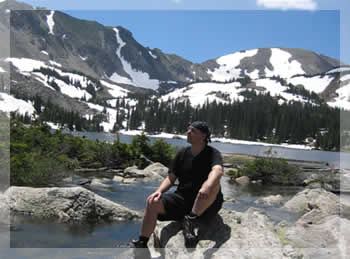
Courses / Teaching
I am currently an Instructor at the University of Colorado at Denver. I received both my Masters and Ph.D. in Philosophy from the University of Colorado, Boulder, as well as a Certificate in College Teaching from the CU Graduate Teacher Program. As a Lecturer and Graduate Instructor, I have taught a wide range of courses (see below) for both the CU Boulder Philosophy Department and the CU Boulder School of Continuing Education.
Awards: For my teaching in these courses, I have won the 2015-2016 Morriston Teaching Award from the Philosophy Department, the campus-wide 2014-2015 CU Graduate Teaching Excellence Award from the Graduate School, and the 2013-2014 “Best Should Teach” Silver Teaching Award from the Graduate Teacher Program, where I also served as Lead Graduate Teacher.
Current Courses at University of Colorado, Denver:
- Phil 2441: Logic, Language and Scientific Reasoning (Fall 2019 and Spring 2020)
- Phil 2550: Investigating Nature (Fall 2019)
- Phil 4350: Philosophy of Science (Spring 2020)
Previous Courses at CU Boulder:
- Phil 1000: Intro to Philosophy (6 semesters 1, 2, 3, 4, 5, CU Canvas )
- Phil 1200: Contemporary Social Problems (3 semesters)
- Phil 3600: Philosophy of Religion
- Phil 2440: Symbolic Logic
- Phil 1200: Intro to Social and Political Philosophy
- Phil 2200: Major Social Theories
- Phil 1100: Intro to Ethics
- Phil 1440: Intro to Logic and Critical Thinking (3 semesters)
- PHIL 1400: Philosophy of Science (TA)
- PHIL1000: Intro to Philosophy (TA- 3 semesters)
- PHIL1100: Intro to Ethics (TA)
Resources for students
A Guide to Writing (M. Huemer)
Guidelines on writing a philosophy paper (J. Pryor)
Writing Philosophy Essays (M. Tooley)
Stanford Encyclopedia of Philosophy
Policies and Such
Plagiarism is copying someone else’s work (including Wikipedia!) and turning it under your own name, without adequate citation of the source(s). Plagiarism is morally wrong because (1) the plagiarist is lying about whose work is being turned in, and (2) it gives the plagiarist an unfair prima facie academic advantage over those who play by the rules and don’t plagiarize. I am a very attentive grader, use “Turn it in”, among other techniques, to look for plagiarism, and it is VERY likely that you will get caught. If I catch you plagiarizing, I’ll turn you over to the Honors Code people and they’ll make your life miserable. So just don’t do it. In case this is not clear enough- DO NOT PLAGIARIZE.
Make use of my office hours! I am happy to talk about anything remotely philosophy-related with you, even things not directly related to the course. I WILL NOT use my office hours, or my email, to fill you in on what happened in lecture or recitation, unless you have a documented and serious reason for being absent. If you miss a lecture or recitation, ask one of your classmates for notes/help. If, on the other hand, you simply didn’t understand what happened during lecture or recitation, I will be happy to discuss it with you.
How To Do Well In My Course:
This course will be fun. If you want to succeed in it, you need to do the following things:
1) DO ALL OF THE READING (you will not get a good grade in this course without reading the material).
2) DO ALL OF THE READING AGAIN (reading philosophy is hard. In my courses, I try to read everything at least twice, but optimally three times, before attending class, and then I usually revisit readings after class).
3) ATTEND ALL OF THE LECTURES AND RECITATIONS.
4) DO NOT WRITE PAPERS THE NIGHT BEFORE THEY ARE DUE (Writing philosophy is also hard; it requires a lot of thought. You are going to need time to process the material, figure out what your thesis is, etc. Seriously: this isn’t a good course to procrastinate in. We’ll talk more about how to write philosophy papers when your first paper is assigned, but this is really the most important thing to avoid, in my opinion).
5) I REPEAT: MAKE USE OF MY OFFICE HOURS.
6) WHEN YOU GET A PAPER OR EXAM BACK, READ MY COMMENTS THOROUGHLY!
And finally, don’t expect to automatically get an A in this course, even if you are used to getting As in most courses—i.e. even if you do all of the above things. Philosophy is rigorous, and difficult. It’s not busy work, or sitting around sharing your feelings. In addition to evaluating whether you have done the readings, attended lecture and recitation, and thought deeply and critically about the issues raised in the course, I will consider the following: how well you develop arguments, how much creativity you demonstrate, and finally (and importantly), how much your philosophical skills develop over the semester.
And remember:
Philosophy is supposed to be fun. If it's not, you're clearly doing something wrong! ;-)
7/3/19: I am thrilled to have accepted a position as an Instructor at the University of Colorado at Denver! I was extremely impressed by the students and community when last I was there, and am excited to be returning to now teach all the core classes for the UCD Philosophy of Science Minor!
5/6/16: I'm honored to be the first person to receive both the CU Boulder Philosophy Department Morriston Teaching Award (2016) and the University of Colorado-Boulder Graduate Teaching Excellence Award (2014-2015)! My thanks go out to the many great teachers and students with whom I've been lucky enough to learn!
Office Hours: By appointment
Location: Remote via Zoom
Please feel free to drop by with any questions, or simply to chat about philosophy, life, the universe and everything...
